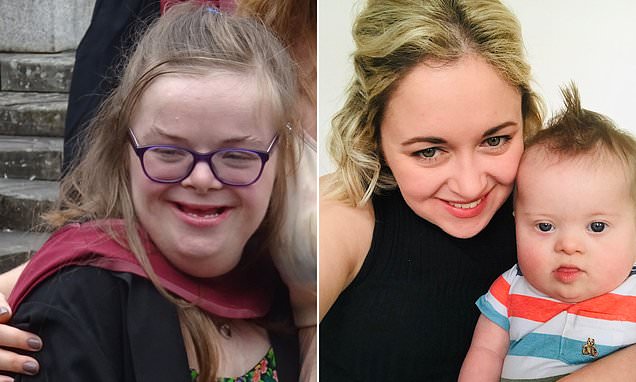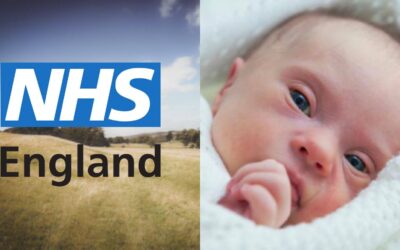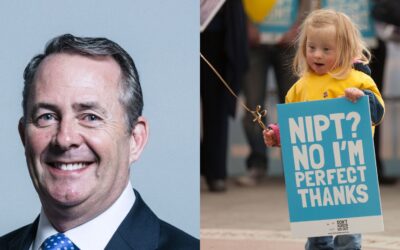PRESS RELEASE FOR IMMEDIATE RELEASE
Woman with Down’s syndrome landmark case against UK Govt over discriminatory abortion law to be heard by High Court
The High Court has granted permission to hear a landmark case against the UK Government over the current discriminatory abortion law which allows abortion up to birth for Down’s syndrome.
Heidi Crowter, a 24-year-old woman from Coventry who has Down’s syndrome, has joined forces with Máire Lea-Wilson from Brentford, West London, whose eleven-month-old son Aidan has Down’s syndrome, to challenge the UK Government over the current law.
Máire Lea-Wilson was placed under pressure to have an abortion when a 34-week scan revealed her son had Down’s syndrome.
Currently in England, Wales and Scotland, there is a general 24-week time limit for abortion, but if the baby has a disability, including Down’s syndrome, cleft lip and club foot, abortion is legal right up to birth.
There were 3,183 disability selective abortions across England & Wales in 2019, with 656 of those occurring following a prenatal diagnosis of Down’s syndrome. The figures are likely to be much higher – a 2013 review showed 886 foetuses were aborted for Down’s syndrome in England and Wales in 2010 but only 482 were reported in Department of Health records. The underreporting was confirmed by a 2014 Department of Health review.
The UN Committee on the Rights of Persons with Disabilities has consistently criticised countries which provide for abortion on the basis of disability.
The Committee on the Rights of Persons with Disabilities Concluding observations on the initial report of the United Kingdom of Great Britain and Northern Ireland made a key recommendation that the UK change its abortion law so that it does not single out babies with disabilities. The Government has decided to ignore this recommendation.
The Disability Rights Commission (now the Equality and Human Rights Commission) have said that this aspect of the Abortion Act “is offensive to many people; it reinforces negative stereotypes of disability…[and] is incompatible with valuing disability and non-disability equally”.
The 2013 Parliamentary Inquiry into Abortion for Disability found the vast majority of those who gave evidence believed allowing abortion up to birth on the grounds of disability is discriminatory, contrary to the spirit of the Equality Act 2010 and that it affects wider public attitudes towards discrimination. The Inquiry recommended Parliament reviews the question of allowing abortion on the grounds of disability and should consider repealing section 1(1)(d) of the Abortion Act which allows for it.
Disabled peer Lord Shinkwin had a Bill in the House of Lords that would have repealed section 1(1)(d) of the Abortion Act – the Bill was undefeated but unfortunately ran out of time. Lord Shinkwin’s Bill was supported by Disability Rights UK.
Boris Johnson’s Government has recently introduced new abortion regulations to Northern Ireland. The regulation that the Northern Ireland Office introduced allow abortion up to birth for disabilities including Down’s syndrome, cleft lip and club foot. 1875 people with Down’s syndrome and their families signed a letter to Boris Johnson urging him to ensure that selective abortion for Down’s syndrome was not introduced to Northern Ireland.
Polling has shown that the majority of people in England, Wales and Scotland feel that disability should not be a grounds for abortion at all, with only one in three people thinking it is acceptable to ban abortion for gender or race but allow it for disability.
Heidi and her legal team have set up a CrowdJustice crowdfunding page to help raise funds for legal proceedings, pay for legal advice and prepare for the case. To find out more and to make a contribution to the case visit:://www.crowdjustice.com/case/downrightdiscrimination/
Heidi Crowter, from Coventry, who has Down’s syndrome said:
“At the moment in the UK, babies can be aborted right up to birth if they are considered to be “seriously handicapped”. They include me in that definition of being seriously handicapped – just because I have an extra chromosome! Can you believe that?
What it says to me is that my life just isn’t as valuable as others, and I don’t think that’s right. I think it’s downright discrimination!
The United Nations Committee on the Rights of Persons with Disabilities recently said that the United Kingdom should change its abortion law to make sure that people like me aren’t singled out because of our disabilities.
Sadly, the Government decided to ignore their recommendations and didn’t change the law. So now, I am going to take the Government to court with other members of the Down’s syndrome community to make sure that people aren’t treated differently because of their disabilities.”
Ms Lea-Wilson, 32, an accountant from Brentford, West London and mother to Aidan who has Down’s syndrome said:
“I have two sons, and I love and value them equally; however, the law does not value them equally. That feels so wrong to me, and so we want to try and change that.
I was 34 weeks pregnant when we discovered it was likely that Aidan would have Down’s syndrome.The first thing they wanted to discuss at the hospital was whether we would like to terminate the pregnancy. It felt like the assumption was that we would abort our baby. At such a late stage of pregnancy, and at a time when I was scared and vulnerable, that was a very difficult question to get asked. I find it very hard to think back on that time.
I find it difficult to think that Aidan’s life isn’t seen as valuable as his older brother’s. It makes me worry as to whether he will be seen the same or treated the same. I also really worry that when he is older, if this law is still in place, how will that make him feel: that he’s not as valuable? That he doesn’t have equal worth?
Our case is not about the rights and wrongs of abortion. It’s about the specific instance of inequality in the law, whereby for a child without a disability the legal limit for abortion is 24 weeks, but you can have an abortion right up to full term with a child that does have a disability.
Aidan is a little ray of sunshine. He’s had some challenges and done so well so we’re just really proud of him. I would not change him for the world.”
Sally Phillips, actress and comedian, mother to Ollie who has Down’s syndrome previously told the Times:
“Given advances in medical care and quality of life for people with Down’s syndrome, the different right to life is beginning to look not just dated but barbaric.”
Lynn Murray, spokesperson for Don’t Screen Us Out, said:
“By stating that disability is grounds for termination, section 1(1)(d) of the Abortion Act, promotes inequality. It would be totally condemned if a country’s abortion laws singled out babies on the ground of gender or skin colour, but because it’s a disability such as Down’s syndrome, that’s somehow ok? This is inequality, sanctioned, sponsored and funded by the state.
This provision in the Abortion Act is a hangover from a time when we had totally different attitudes to the inclusion and contribution of people with disabilities. You only have to look at the discriminatory language used by all sides of the debate in Parliament when this was discussed in 1967 and 1990 to realise how far attitudes have changed. Society has moved on but the law hasn’t. It’s time it did.”
We live in a society which proclaims that we want to empower those with disabilities, and that regardless of your background, you deserve a fair and equal chance at life. We believe that our laws must reflect this narrative.”
ENDS
- For more information on the Don’t Screen Us Out campaign, see our website www.dontscreenusout.org or email info@dontscreenusout.org
- For interviews, contact Don’t Screen Us Out spokesperson Lynn Murray on 0784 0966 736 or email info@dontscreenusout.org
- Heidi’s Facebook page:
- Previous news coverage featuring Heidi Crowter:
- https://www.dailymail.co.uk/news/article-8351603/Woman-Downs-Syndrome-launches-legal-bid-end-abortion-discrimination.html
- Victoria Derbyshire Show – https://www.youtube.com/watch?v=eeNuWj3xhbM
- Channel 5 News – https://www.youtube.com/watch?v=eeNuWj3xhbM
- https://www.theguardian.com/society/2018/dec/03/my-life-is-just-as-important-as-everybody-elses-meet-the-disability-leaders
- https://www.bbc.co.uk/news/av/45790521/the-23-year-old-busting-myths-about-down-s-syndrome
- https://www.itv.com/news/central/2019-03-21/he-makes-me-the-happiest-girl-in-the-world-twenty-three-year-old-with-downs-on-her-love-life-and-work-wouldntchangeathing-downs-syndrome-world-downs-syndrome-day/
- https://www.huffingtonpost.co.uk/entry/having-downs-syndrome-doesnt-make-me-less-of-a-person_uk
- https://www.dailymail.co.uk/video/news/video-1318649/Heidi-Crowter-s-powerful-s-Syndrome-message-Jeremy-Hunt.html
- Down’s syndrome abortion figures are expected to increase as NIPT is rolled out across hospitals on the NHS. The number of babies born with Down’s syndrome has dropped by 30% in NHS hospitals that have introduced the new test.



